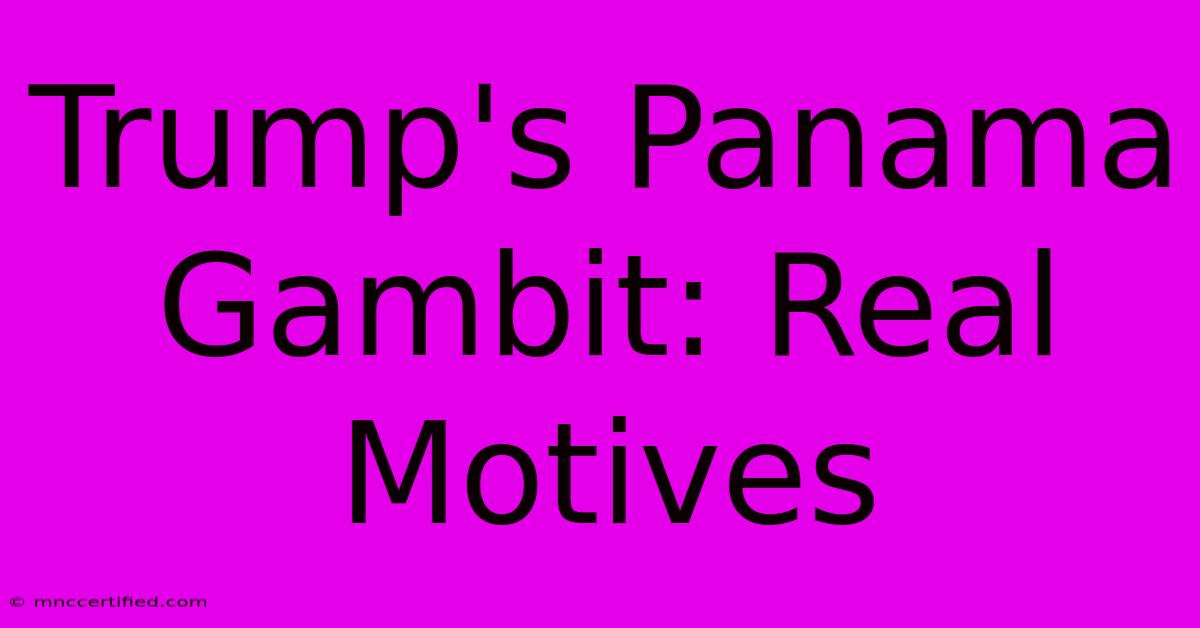Trump's Panama Gambit: Real Motives

Table of Contents
Trump's Panama Gambit: Unpacking the Real Motives Behind the Trump Ocean Club
Donald Trump's business dealings have always been shrouded in a certain level of mystery, and his involvement with the Trump Ocean Club International Hotel & Tower in Panama City is no exception. While officially presented as a luxury real estate venture, analysts and journalists have unearthed various potential underlying motives beyond simple profit maximization. This article delves into the complexities of Trump's Panama project, exploring the potential real motives behind this ambitious, and ultimately controversial, undertaking.
Beyond the Glittering Facade: Financial Incentives and Tax Strategies
One of the most obvious, yet often overlooked, motivations behind the Trump Ocean Club was the potential for significant financial gain. Panama, known for its lax financial regulations and favorable tax haven status (at the time of the project's development), offered attractive opportunities for investment and profit generation. Trump's involvement could be seen as a strategic move to leverage these conditions, potentially minimizing tax liabilities and maximizing returns. This aligns with Trump's well-documented history of aggressive tax optimization strategies. Further investigation into the project's financing and subsequent financial performance is needed to fully understand the extent of these financial benefits.
The Role of Debt and Offshore Entities
The construction and operation of the Trump Ocean Club involved complex financial arrangements, including substantial debt financing. Understanding the precise nature of these financial instruments and the involvement of offshore entities is crucial to unraveling the complete financial picture. The use of offshore entities, while not illegal in itself, raises questions about transparency and accountability, adding another layer of complexity to the analysis of Trump's motivations. This aspect warrants deeper scrutiny, particularly regarding potential connections to other Trump business ventures.
Geopolitical Ambitions and International Influence
Beyond the purely financial aspects, some analysts suggest that Trump's Panama involvement might have been driven by broader geopolitical ambitions. Panama's strategic location, acting as a crucial link between North and South America, offers significant potential for international business expansion and influence. The Trump Ocean Club could be interpreted as a strategic foothold in Latin America, opening doors to further investments and business opportunities in the region. This angle requires examining the broader context of Trump's business dealings in Latin America and his overall foreign policy approach during his presidency.
Reputational Branding and Image Projection
Trump’s projects are often as much about branding and image projection as they are about profit. The Trump Ocean Club, with its luxurious amenities and prominent branding, served as a powerful symbol of success and opulence. This aligned perfectly with Trump's self-crafted image as a successful businessman and magnate. The project's association with his name, irrespective of its financial performance, could be viewed as a significant component of his overall brand-building strategy. Analyzing the media coverage and public perception of the project is vital to evaluating the effectiveness of this reputational strategy.
The Legacy of Controversy
The Trump Ocean Club's story is not without its controversies. Reports of labor disputes, financial irregularities, and legal challenges have further clouded the project's legacy. Examining these controversies and their potential impact on Trump's reputation and business interests is essential for a comprehensive understanding of his motivations. These controversies highlight the need for a thorough and unbiased investigation into the project's full impact.
Conclusion: A Multifaceted Motive
In conclusion, Trump's involvement in the Trump Ocean Club in Panama is likely driven by a multifaceted set of motives extending beyond simple profit maximization. Financial incentives, geopolitical ambitions, reputational branding, and the inherent complexities of international business all played a significant role. A complete understanding requires further investigation into the project's financial details, its geopolitical context, and its overall impact on Trump's business empire and public image. The Trump Ocean Club case study serves as a valuable lens through which to examine the intricate web of motives that underpin Trump's business ventures. Future research should prioritize transparency and access to relevant financial records to shed more light on this complex issue.

Thank you for visiting our website wich cover about Trump's Panama Gambit: Real Motives. We hope the information provided has been useful to you. Feel free to contact us if you have any questions or need further assistance. See you next time and dont miss to bookmark.
Featured Posts
-
Manchester United Vs Bournemouth No Tv
Dec 23, 2024
-
Cardinals Lose To Panthers In Ot
Dec 23, 2024
-
24 6 Bengals Win Browns Postgame Notes
Dec 23, 2024
-
Patriots Vs Bills Week 16 Game Time And Channel
Dec 23, 2024
-
Where To Shop Sunday Holiday Hours
Dec 23, 2024